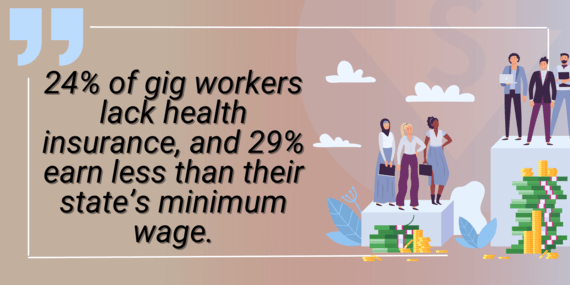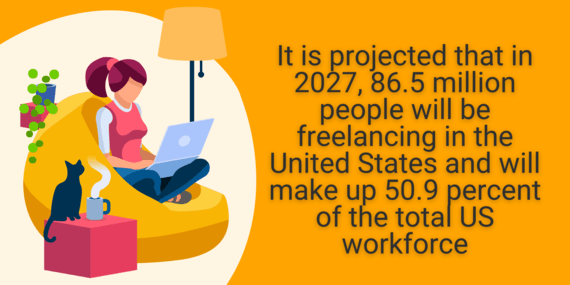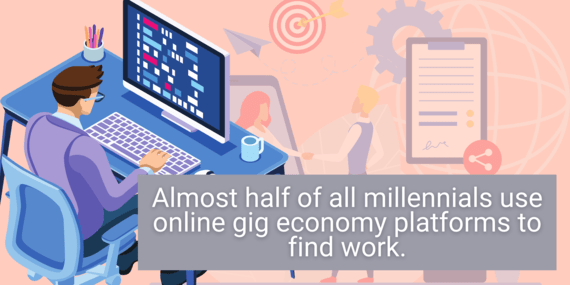
Gig Economy: Adopting Flexible Staffing in Your Workforce
In today’s modern world🌎, there’s more to companies than just the traditional jobs we first think of. The gig economy is a rising force that changes the way we look at hiring employees, as it offers a different strategy to benefit employees and your business. 📈
Gig employment often consists of employees working remotely on digital platforms. 👩💻Under this working arrangement, freelancers, workers, and contractors are paid under a fixed-contract agreement. According to a study, “the gig economy grew by 33% in 2020, expanding 8.25x faster than the US economy as a whole.”
The Covid-19 pandemic significantly impacted the gig economy, as employees were relied on to deliver services to consumers and customers from their homes, working remotely. The pandemic brought job flexibility to light, and many people found the freedom they could have at work appealing.🧑💻

Source: Ultimate Gig: Flexibility, Freedom, Rewards.
What are the ways to incorporate the gig economy in the workplace? How to incorporate gig workers into your workforce?
Let’s examine the gig economy in more detail and answer those critical questions.
What Does the Gig Economy Have that Contributes to its Success?⭐️
Most businesses shifted to virtual operations to lessen contacts in compliance with the health protocols during the pandemic. Hence, it resulted in a spike in freelancing jobs where the fixed-price contract is held.
Aside from it being less expensive, the gig economy enables HR recruiters to tap into a larger pool of skilled workers. According to statistics, in 2023 73.3 million freelancers are estimated to work in the USA and in 2024, 76.4 million are expected.
Alongside the changes in the diverse workforce arrangements, technologies are up to support virtual set-ups. Companies couldn’t ignore that hiring short-term but talented individuals could help the company increase its sales while cutting down expenses.
The 5 Downsides of the Gig Economy👎
Despite the growing trend, the gig economy also holds various disadvantages, and there is a lack of benefits for companies and employees. The gig economy comes with challenges that must be taken into consideration before you adopt the concept into your company.
Let’s look at some of the downsides of the gig economy.
1. The Inability to Support Multiple Employees’ Needs🤒
Employee needs, such as accidents or health insurance may be impacted. Working in a short-term and contractual mode prevents companies from covering employee benefits. This may leave workers vulnerable, especially in their times of need.
2. Isolation and Loneliness🧍♀️
Gig workers usually work remotely on tasks, reducing the amount of social interaction they may have. Working in the gig economy can be lonely, isolating and may impact a person’s job performance.
3. Privacy Concerns🔒
Some companies find sharing private information uneasy. Hence, they only share information for small-time projects.
4. Poor Communication🗣
Managing remote workers may be more difficult as communication is more of a challenge. Feedback, instructions, or general communication can often be a struggle with the gig workforce.
5. Lack of Laws and Government Regulations📄
Hiring gig workers is challenging, so document manipulation is prevalent since freelancing has no verification method that examines workers’ credibility.

Source: Finmasters
While there may be many job opportunities for gig workers, it’s worth considering the challenges the employee and company may face. Hiring remote, independent workers may benefit your business primarily, but being aware of the drawbacks is essential.
Let’s take a look at the benefits:
The 4 Benefits of the Gig Economy👍
The gig economy benefits employees and businesses, and this modern approach can create a dynamic and transformative workforce for your company.
Let’s take a closer look at the 4 benefits of the gig economy:
1. Flexibility📆
One of the most prevalent advantages of the gig economy is its flexibility. Unlike a full-time job, freelance workers can choose their schedules and make productive use of their time independently while working towards a deadline.
By making the most of remote workers and utilizing their skills, they’ll feel more motivated, productive and produce high-quality work.🤩

Source: Statista
2. Scaling Made Easy
In permanent work, HR recruiters often face the challenge of a more stringent and long-term hiring process because they wouldn’t want to hire someone incapable of working on their project.
Alongside this hiring is the need for businesses to supply funding, like hiring recruiters, creating advanced analytics, and creating advertisements. This is where the gig economy offers benefits because it allows a shorter hiring period.🤝
Also, it avoids expensive separation pay or lengthy processing during the termination phase of the project. The gig economy allows companies to gauge their resources, modify their tools, and scale their funds depending on the demands of their surroundings.

Source: Fortunly
3. Trial Mode Abilities
In the typical hiring process, HR recruiters are left with no choice but to employ employees with a showy attitude; these applicants may fake their performance to land the job. However, HR recruiters couldn’t just fire someone because they have signed the contract.✍️
The gig economy addresses this problem because some companies ask for trial performance from freelancers to decide, based on performance, who is fit for the position. It allows employers to examine talents that a typical working mode couldn’t offer.
4. Saves Company Funds💰
Despite gig workers having higher hourly rates than permanent or full-time employees, companies could still save costs since they don’t have to cover up for the benefits of these workers.
The 6 Ways to Incorporate Gig Economy
As an uprising business model, you can incorporate the gig economy into your company and experience the benefits for yourself.
Here are the six ways to incorporate this trendy model:
1. Know the Law🤔
Despite the relatively new gig economy, only a few countries mandate laws and regulations regarding freelancing, especially on tax provisions. Your HR recruiters should be able to study this in detail. Your hiring managers should be able to equip gig workers with beneficial and attractive policies for the company and the workers.
2. Short-Term Training⏰
As a manager, you should shorten the hiring and training process so gig workers can start their jobs immediately. Remember that as gig workers, they also have other inline gigs; hence, delaying their time could upset their performance.
To successfully incorporate the gig economy into the workplace, companies should allow more flexible working hours to get talented workers.
3. Attract More Gig Workers👋
Remember that once you hire the perfect match for the job, you should successfully incorporate the gig economy into the workplace. Companies should try to attract them to re-apply and take more work. Gig employment is a popular choice, and according to a study, “there are 9.94 million self-employed people in the US as of January 2023.”
You could incentivize these talented workers so they will be inspired to work with you again! The goal here is to hire as many gifted individuals capable of performing your tasks.
You may also use the technique of “recommendation,” where your gig workers will recommend your job opening to their colleagues whom they can see as equally capable to them. Promote a culture of protection and security by allowing these workers to grow and benefit.
4. Promote a Flexible Schedule🗓
The best way to improve your culture is to promote the work-life balance principle in all aspects. Who wouldn’t want flexible working hours and other holidays? Perhaps these freelancers chose gig work as a path to avoid the pressures of the corporate ladder.🧗♂️
Ensure workers will not be overworked with unnecessary calls and meetings outside their desired time. You could also provide them with part-time or flexible working hours to do other things that are relevant to them.
Favoring their preferences could result in a more effective output because your working culture inspires them. An effective scheduling software will promote communication, reduce errors and save time.⌚️
5. Provide Roles Fit for Gig Workers🧑💻
You might already have existing rules about gig workers or independent contractors in your company, but you must recheck these policies to attract more gig workers. Some companies are hiring gig workers for low and short-time positions.
However, you may experiment by allowing managerial positions vacant to be filled by a gig worker. You may attract them to apply to your company for the experience. Who knows, you might find an exemplary leader among this roster of talented people.
According to a study, more than 90% of US workers would consider freelancing or independent contracting work, suggesting the amount of gig workers you could attract to your company with the right roles available.
6. Allow Access to Company Materials🔓
To ensure an excellent culture for gig workers, you must ensure they won’t feel excluded from the company. You could allow them limited access to company materials so they could have their creative input.
Also, you may enable them to communicate with any members of the company hierarchy so they won’t be estranged from your company. Promoting inclusivity to your employees could allow camaraderie and creativity to arise. By incorporating an efficient messaging software, you could boost employee engagement and involvement.💬
The gig economy is a rising business model that is very applicable. Allowing flexible staffing provides you control depending on the demand and surrounding situation. However, even though you want to incorporate the gig economy, you must make amendments to benefit gig workers due to possible drawbacks.
Navigating gig employment is essential to make it work for your employees and company. You can make it work by adapting to the work style, understanding the flexibility, and incorporating it seamlessly into your business.
- Gig Economy: Adopting Flexible Staffing in Your Workforce
- What Does Gig Economy Have That Contributes To Its Success?
- The 5 Downsides Of The Gig Economy
- 1. The Inability To Support Multiple Employees' Needs
- 2. Isolation And Loneliness
- 3. Privacy Concerns
- 4. Poor Communication
- 5. Lack Of Laws And Government Regulations
- The Benefits Of The Gig Economy
- 1. Flexibility
- 2. Scaling Made Easy
- 3. Trial Mode Abilities
- 4. Saves Company Funds
- The 6 Ways To Incorporate Gig Economy
- 1. Know The Law
- 2. Short-Term Training
- 3. Attract More Gig Workers
- 4. Promote A Flexible Schedule
- 5. Provide Roles Fit For Gig Workers
- 6. Allow Access To Company Materials






